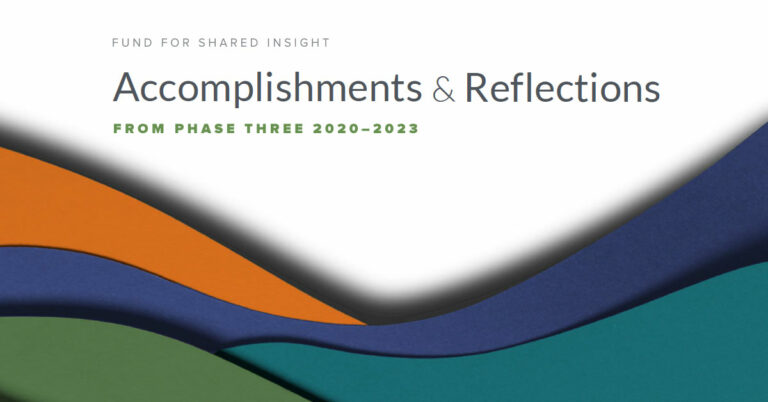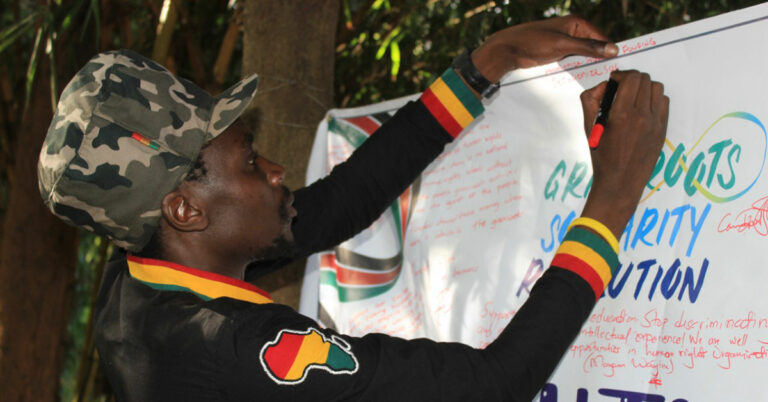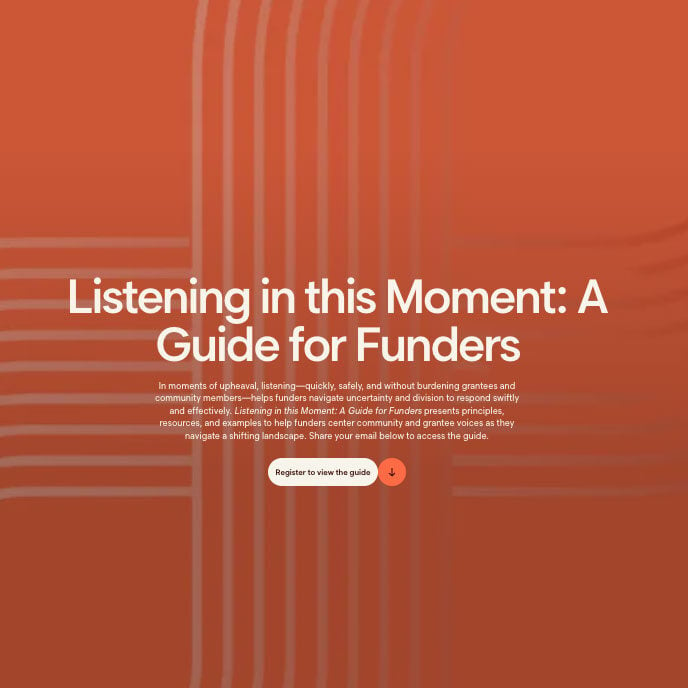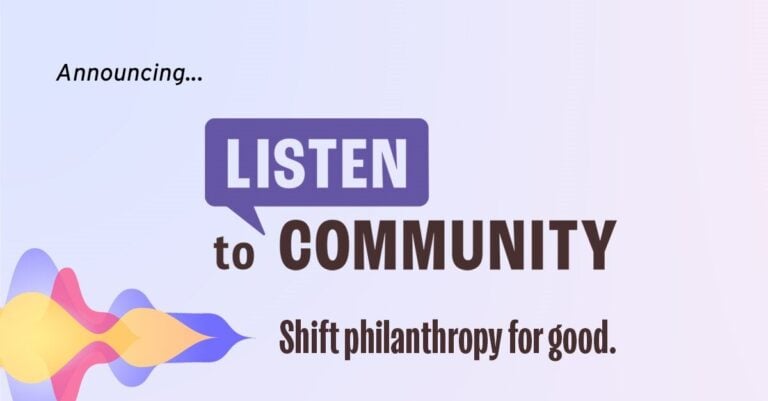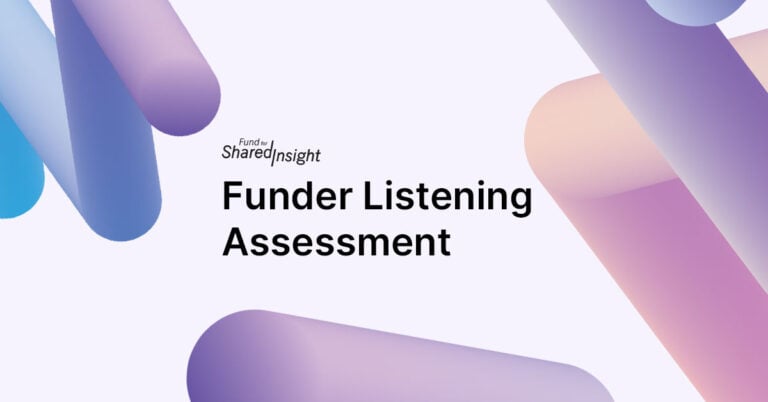At Fund for Shared Insight, a key goal is to improve philanthropy and advance equity by guiding more and more funders and nonprofits to shift and share power with the people and communities at the heart of our work. Are we making progress toward that goal?
This is the question we are continually asking ORS Impact, our longtime evaluation and learning partner. ORS has been embedded in our work since the start, attending core funder meetings, participating on committees, and holding up a mirror to prompt reflection, course correction, and improvement.
Now, nine years from our founding, ORS has published its third three-year report to assess outcomes, progress, and lessons learned. (For ORS assessments from earlier years, please see reports from Phase I and Phase II.)
“Accomplishments & Reflections from Phase III 2020 – 2023” takes a high-level look at the last few years. It also pulls back further to assess the cumulative effect of Shared Insight’s work over time. The report provides insights that help us learn and refine our theory of change toward our desired impact. It also provides provocations meant to help focus our energy, resources, and attention in the coming years.
Drawing on qualitative and quantitative data collected over the past three years, the report rates the strength of outcomes in each area of our theory of change. Overall, we have made progress to increase knowledge and practice of high-quality listening by nonprofits and funders. These practices have not yet become the norm nor changed underlying power dynamics in the field.
Key Findings
ORS finds the strongest progress in our short-term outcomes, medium-low progress in our medium-term outcomes, and signs of hope across our long-term outcomes.
Areas rated as showing strong progress:
- Shared Insight increases knowledge about different kinds of listening practices
- More U.S. nonprofits have a high-quality feedback practice and intentionally address issues related to client feedback
- Shared Insight funders use feedback, support nonprofit feedback practice, and share lessons to promote feedback
Areas rated as showing medium progress:
- A greater number and variety of funders, nonprofits, and social sector organizations value, promote, and actively support/use high-quality feedback
- More U.S. funders promote high-quality listening and feedback for nonprofits and themselves
- More nonprofits embrace high-quality listening and feedback practices that advance equity
Areas rated as showing low progress:
- More funders use feedback or other high-quality listening practices to incorporate the perspectives of people and communities impacted by their decisions, and support nonprofits to do the same
- High-quality listening and feedback practices that advance equity become an expected standard among foundations and nonprofits
Many of the strong outcomes related to nonprofit adoption of high-quality feedback are attributable to the growth and success of Listen4Good, Shared Insight’s signature capacity building program for nonprofits, which has worked with nearly 800 direct-service nonprofits across the U.S. to date. Now that we have spun Listen4Good out as an independent entity, we look forward to supporting Listen4Good’s future impact while doubling down on Shared Insight’s ongoing goal to influence and change funder listening practice.
The new ORS report acknowledges that we are on our way in that direction. It notes a “different sense of focus and momentum” than in prior years around this work. Our Funder Listening Community of Practice (FLCP), which now includes twelve of the leading philanthropy-serving organizations in the sector, is one important way in which we are investing in this area.
The report also finds that in contrast to earlier phases, equity, diversity, and inclusion (EDI) in Phase III “felt like it became much more embedded, less ‘bolted on.’” We are explicitly focusing on sharing and shifting power in all aspects of our work, particularly by stepping up our attention around funder listening.
The report ends with provocations as we launch Phase IV with the intention of leaving behind a strong and sustainable feedback field. Among the questions from ORS that we’ll be considering:
In the nonprofit sector:
- “Current feedback field effort approaches tend to favor direct-service nonprofits. Is that sufficient? Is more support needed to reach nonprofits that work on systems and policy change?”
- “How will the field more broadly think about reaching and supporting less-resourced nonprofits? Are we inadvertently reinforcing historic patterns of underinvestment in nonprofits led by people of color?”
- “To what degree can/should Shared Insight and the feedback field expand how ‘quality’ and ‘practice’ are defined to be inclusive of alternative (non-white-dominant) ways of being and doing this work?”
In philanthropy:
- “Do the core funders think this influence strategy [that the larger, mostly national funders around the Shared Insight core funder table will influence the field and other funders if they take up and promote high-quality listening and feedback practices] is important, meaningful, and relevant? If yes, should there be more or different support in this area?”
- “How do we ensure Shared Insight’s work serves as a tool of transformation? Changing power dynamics – how nonprofit professionals and funders see their roles, hold power, and engage with those they seek to support – is not a small technical change; it represents a large mindset shift around what kind(s) of expertise is important and valued.”
I see anecdotal evidence all the time that more funders are willing to engage on these topics. For example, about one third of attendees at Feedback Labs’ annual Feedback Summit earlier this year were from foundations. At the recent Grantmakers for Effective Organizations Learning Conference, listening to community was embedded in the agenda at multiple levels, including comments from the plenary stage and multiple breakout sessions. And a packed room showed up for the launch of our new Participatory Philanthropy Toolkit.
We see encouraging signs that a wider and more diverse group of funders understands the importance of listening, responding, and shifting power to the people and communities most impacted by our decisions. As we enter our next phase, Shared Insight is excited to build on this momentum — and the progress and signs of hope identified in the ORS report.
About the author:


